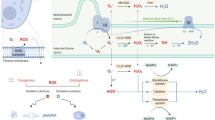Abstract.
In Bacillus subtilis, osmotolerance is a stationary phase-dependent, adaptive response inhibiting sporulation and sharing common regulators with this process. The extent of this inhibition was determined by measuring transcription activity of promoter lacZ fusions to early sigma genes (spoIIG and spoIIA coding for precursors of σE and σF) and to reporters of them (spoIID, spoIIQ and spoIIIG), in the absence and presence of 0.6 M or 1 M NaCl. The transcription activity of these sigma precursors, normally occurring at the onset of the stationary phase, was reduced to 30–50% of their maximal expression in hyperosmotic conditions; expression of genes under their control was, however, more inhibited (<10%). Therefore, sporulation was blocked at the sigma σE and σF activation steps. This assumption was confirmed by electron microscopic examinations of hyperosmotic cultures, which presented asymmetric septa characteristic of stage II mutants. Discussion was focused on the particular composition and/or structure of membranes during hyperosmotic growth and their involvement in the arrest of sporulation.
Similar content being viewed by others
Author information
Authors and Affiliations
Additional information
Received: 16 June 1997 / Accepted: 22 July 1997
Rights and permissions
About this article
Cite this article
Ruzal, S., López, C., Rivas, E. et al. Osmotic Strength Blocks Sporulation at Stage II by Impeding Activation of Early Sigma Factors in Bacillus subtilis . Curr Microbiol 36, 75–79 (1998). https://doi.org/10.1007/s002849900282
Issue Date:
DOI: https://doi.org/10.1007/s002849900282




